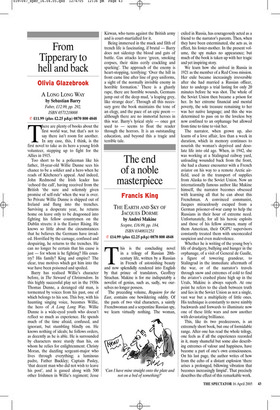The end of a noble masterpiece
Francis King
THE EARTH AND SKY OF JACQUES DORME by Andrei Makine Sceptre, £16.99, pp. 184, ISBN 0340831251 ✆ £14.99 (plus £2.25 p&p) 0870 800 4848 This is the concluding novel in a trilogy of Russian 20thcentury life, written by a Russian in French of astonishing beauty and now splendidly rendered into English by that prince of translators, Geoffrey Strachan. Makine is for me indisputably a novelist of genius, such as, sadly, we ourselves no longer possess.
The preceding volume, Requiem for the East, contains one bewildering oddity. Of the pasts of two vital characters, a saintly Frenchwoman and a serpentine Russian spy, we learn virtually nothing. The woman, exiled in Russia, has courageously acted as a friend to the narrator’s parents. Then, when they have been exterminated, she acts as, in effect, his foster-mother. In the present volume, the spy makes no appearance; but much of the book is taken up with her tragic and yet inspiring story.
We learn how she arrived in Russia in 1921 as the member of a Red Cross mission. Her exile became increasingly irreversible after she had married a Russian officer, later to undergo a trial lasting for only 20 minutes before he was shot. The whole of the Soviet Union then became a prison for her. In her extreme financial and mental poverty, the sole treasure remaining to her was her native language; and this she was determined to pass on to the loveless boy now confined to an orphanage but allowed from time to time to visit her.
The narrator, when grown up, also learns of a love affair, less than a week in duration, which in memory continues to nourish the woman’s deprived and desolate life into old age. When, in 1942, she was working at a Stalingrad railway yard, unloading wounded back from the front, she had a chance encounter with a French aviator on his way to a remote Arctic airfield, used in the transport of supplies from Alaska to the Soviet Union. Now an internationally famous author like Makine himself, the narrator becomes obsessed with learning all that he can about this Frenchman. A convinced communist, Jacques miraculously escaped from a German prisoner-of-war camp to help the Russians in their hour of extreme need. Unfortunately, for all his heroic exploits and those of his fellow airmen, many of them American, their OGPU supervisors constantly treated them with unconcealed suspicion and even malevolence.
Whether he is writing of the young boy’s life of drudgery, bullying and hunger in the orphanage, of a visit of General de Gaulle, a figure of towering grandeur, to Stalingrad in the immediate aftermath of the war, or of the narrator’s travels through snow and extremes of cold to find the aviator’s crashed plane high up in the Urals, Makine is always superb. At one point he refers to the clash between truth and lies in the Soviet Union as not a single, vast war but a multiplicity of little ones. His technique is constantly to move nimbly backwards and forwards to illuminate now one of these little wars and now another with devastating brilliance.
This, like its two predecessors, is an extremely short book, but one of formidable range. After one has read the whole trilogy, one feels as if all the experiences recorded in it, many shameful but some also describing extremes of valour and happiness, have become a part of one’s own consciousness. On his last page, the author writes of how from the echo of a distant explosion ‘there arises a prolonged, billowing vibration that becomes increasingly limpid’. That precisely describes the effect of this remarkable work.
























































 Previous page
Previous page